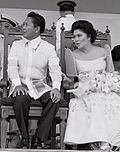Third Republic presidential elections
Before the election of Ferdinand Marcos in 1965, it was President Elpidio Quirino who consistently carried the Ilocano heartland in the presidential elections during which he was a candidate. Despite Ramon Magsaysay's landslide victory in the 1953 presidential election, Quirino still won in his home province of Ilocos Sur, as well as Ilocos Norte, Abra and La Union.
In the 1965 presidential election, Senator Ferdinand Marcos of the Nacionalista Party, from Ilocos Norte, faced the incumbent president Diosdado Macapagal of the Liberal Party, who hailed from Pampanga. Marcos successfully campaigned on the issues of graft, peace and order, and economic progress, although these had been staple campaign issues since independence. [7] Marcos carried not only the Solid North, but most of Luzon as well, with Macapagal only carrying the provinces of Pampanga, Tarlac and Bataan.
While Marcos won an even larger mandate during his successful reelection bid in 1969, support from the Solid North was not as crucial in his victory. Pampanga and Antique in the Visayas were the only provinces that he did not win.
1986 snap presidential election
Marcos eventually declared martial law and stayed in power until 1986, when he called for a "snap election". With his popularity declining after the assassination of Benigno Aquino Jr., Marcos relied heavily on support from the Solid North in the 1986 election, when he faced Aquino's widow, Corazon Aquino. Marcos depended on the Ilocos Region, described as "impregnable to the opposition", and on Eastern Visayas, the home region of his wife, First Lady Imelda Marcos. [8] Marcos was eventually declared the winner but allegations of massive fraud erupted into the People Power Revolution which drove the Marcoses into exile and concluded with Aquino's ascension into the presidency.
Fifth Republic elections
Beginning in 1992, the Solid North did not deliver a solid vote for a single candidate. Two figures associated with Ferdinand Marcos, his widow, Imelda Marcos, and one of his allies, Danding Cojuangco, won in several provinces of the Solid North. In the vice presidential election, Joseph Estrada won all provinces as running mate of Cojuangco. In 1998, Imelda, who initially planned to run again, endorsed eventual winner Joseph Estrada, who won in all northern provinces except Cagayan which was won by Juan Ponce Enrile.
In 2004, Fernando Poe Jr.'s campaign was endorsed by Imelda for the presidency. [9] He would win in most provinces except Benguet, Ifugao, Ilocos Sur, Kalinga, and Mountain Province. Poe narrowly lost to incumbent president Gloria Macapagal Arroyo, but the election would later be tainted by fraud allegations.
In 2010, the Marcoses supported the candidacy of Manny Villar of the Nacionalista Party, while Joseph Estrada ran again but without support from the Marcoses. [10] The bloc was divided between Villar, Estrada, and winner Aquino III in the presidential election; and divided between winner Jejomar Binay, Loren Legarda and KBL candidate Jay Sonza. Both Villar and Estrada lost the presidential election. Meanwhile, several Marcoses ran in the elections; Bongbong Marcos, who ran for senator under Villar's slate, won a seat, Imelda Marcos won a seat in the House of Representatives, and Imee Marcos won the gubernatorial election in Ilocos Norte. Bongbong's Senate victory is the highest elected position won by a Marcos since their ouster in 1986. [11] According to Bongbong, his candidacy made the Solid North "intact again." [12]
In 2016, Bongbong ran for vice president as the running mate of senator Miriam Defensor Santiago. Marcos won in all of the Solid North provinces except Batanes, but lost to Leni Robredo. Marcos later filed an electoral protest which was dismissed. [13] In the presidential race, the bloc was not as solid, with some voting for Jejomar Binay, running mate of Estrada in 2010, and Rodrigo Duterte, who has been endorsed by some alongside Marcos, [14] and Grace Poe, daughter of Fernando Poe Jr. [3]
In 2022, Bongbong ran for president alongside Sara Duterte as his running mate. Marcos won again in all provinces except Batanes, while Duterte won in all of the Solid North provinces. [15] [16]



















